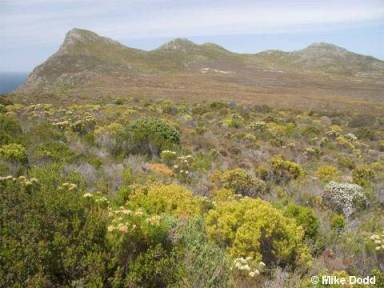Ecohydrology of South African Fynbos Plants
The Cape Floristic Region (CFR) contains nearly 9,000 plant species, the majority of which are found nowhere else on Earth. The value of this hotspot of biodiversity is recognized by the United Nations which has awarded the region World Heritage Status.
One of the most important habitat of the CFR is the fynbos. Fynbos (meaning "fine bush" in Afrikaans) is the natural shrubland/heathland vegetation occurring, mainly in winter rainfall Mediterranean climate areas of the Western Cape. Much of fynbos is protected by a network of reserves in the management/oversight of Cape Nature and South African National Parks.

Why the project is needed
Rapid population growth and economic development in the Western Cape region are placing increasing demands upon water resources. To meet the urban demand for water, increased abstraction from the sandstone aquifers underlying important fynbos habitats is being planned. Currently, very little is known about how such abstraction might affect the Cape flora and there is almost no information at all about the eco-hydrology of Cape plants. Our team from the Open University (UK) are working in cooperation with the South African National Biodiversity Institute (SANBI) at Kirstenbosch, Cape Nature and South African National Parks.
Project purpose
To provide a quantitative, scientific basis for the incorporation of eco-hydrology in the
management of fynbos habitats potentially threatened by water abstraction in the Cape
Floristic Region. Success will be measured & verified by the inclusion of eco-hydrological
data in impact assessments and conservation management plans.
Benefits of the project
The project will extend knowledge of how fynbos plants depend upon hydrological conditions. In particular, we are currently focusing upon the restios which are ecologically important to fynbos ecosystems. We intend to involve Cape Nature’s own field staff in the research and to provide them with training in how to monitor and assess the hydrology of the sites in their care. This will accomplish several aims simultaneously: providing a means of career advancement for Historically Disadvantaged workers; transferring skills and knowledge from the UK to South Africa; increasing capacity for conservation research in SA; providing a firm scientific basis for the evaluation of the risks posed to fynbos and a basis for minimising these.
Funding
The research we have conducted so far has been supported financially by the Leverhulme Trust which provided a grant for the pilot study (2005-2007). From 2007-2010 we are in receipt of grant from Darwin Initiative (DEFRA of the UK Government) to expand the investigation and at the same time train local personnel to ensure future sustainability.

Contact us
The Open University:
Prof. Jonathan Silvertown
Prof. David Gowing
Dr. Yoseph Araya
Prof. Edward Youngs
https://www.open.ac.uk
South African National Biodiversity Institute:
Dr. Guy Midgley
Dr. Nick Walker (2008)
James Ayuk
Deryck De Witt
http://www.sanbi.org
Cape Nature:
Dr. Ernst Baard
http://www.capenature.co.za
University of Zurich:
Prof. Peter Linder
http://www.unizh.ch
Els Dorratt Haaksma
Project Leader/Contact
Prof. Jonathan Silvertown
Department of Life Sciences
The Open University, Walton Hall
Milton Keynes, MK7 6AA
United Kingdom
Prof. Jonathan Silvertown's website